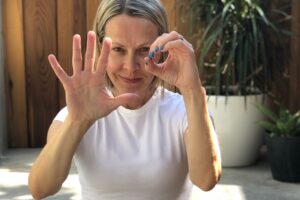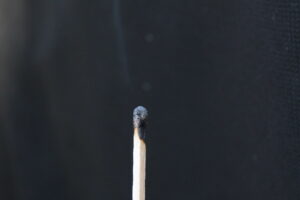A few months before I moved to Los Angeles I had back surgery. A bulging, cranky disc between my L4/L5 vertebrae suddenly ruptured scattering fibrous shrapnel throughout my spinal canal and leaving me unable to walk. The pain was so intolerable that I pounded scotch just to keep my wits about me for the two weeks it took my doctor to recognize that I hadn’t merely pulled a muscle. An MRI led to emergency surgery, which led to a morphine drip and a Jamaican nurse with a giant bosom who cradled me like I was a child of her own. The relief from my agony was spectacular, but it took years of different therapies (and ultimately the flood of hormones during pregnancy) to render me truly pain-free. So when I landed in California and a new friend suggested I see her acupuncturist to help with my recovery, I wasted no time in making an appointment.
Dr. P. was a mere five years my senior and looked more like a lawyer than a practitioner of alternative medicine. She wore high heels and tailored skirts and bright red lipstick, and she exuded confidence. Originally an MD from Uzbekistan, she emigrated with her husband and young child in her twenties, reinventing herself in America without ever missing a beat. She was intimidating, but also relatable given my father’s shared experience with mother Russia. She was one of those practical, thriving professional women who made me question both my wardrobe and career choice. While I struggled to make a go of it in the no-guarantee field of the arts, she was a business owner, a doctor, a parent. In short, she had her shit together in spades.
Which is why I was so surprised when one day, before needling me, she grabbed my hand and started to read my palm. I’d never before had a reading, but I trusted her and went along with it. Fingering over the lines in my hand, she matter-of-factly stated, “I see two marriages, two kids, and a long-life. Oh…and you will have success.” Forget the fact that I was recently divorced and had zero intention of remarrying, that children were nowhere on my radar, and that I was still feeling deeply impermanent following my mother’s death, all I could hear was the word success.
“Really?” I asked, suddenly convinced she was an oracle in a white coat and pumps. And then, trying to be cool, “Um, what exactly do you mean by success?”
“Oh, well, not now, dah-link,” (insert exaggerated Soviet accent). “Later in your life—40s or 50s. Eventually. It is good.”
What? My forties or fifties? No, it is not good. I was 32 and an aspiring writer who had just moved to Hollywood hoping to make it big. And here I was being told that it would be another fifteen, maybe twenty years of paying dues, working for free, and exhaustively hustling before success would be mine? This isn’t good news at all, Dr. P. This is a death sentence. In fact, why don’t I just lock my writing in a drawer, travel the world for the next two decades, and return when lady luck decides to shine down on me?
Two things stand out as remarkable when I think back on that experience: 1) how quickly I handed over the trajectory of my life to my acupuncturist after a 30-second palm reading; and 2) that my idea of success hinged upon two of the most elusive and highly-charged words in the English dictionary: fame and fortune.
To be fair to my younger self, I think many people, certainly in their early career years, use the green stuff, or just stuff, as a measure of success. But coming out of theatre school as I did, and for people I’ve met who’ve graduated from film school or art school, the achievement of fame (whether it’s stardom or just being known for your work) equals, if not surpasses, the quest for wealth. Conscious or not, the craving for recognition attaches itself to your psyche like those five pounds of weight you can never lose, handing over the validation of your existence to someone other than yourself and the belief that only they can usher you out of obscurity. To this day, I still feel vulnerable and insecure when standing amongst a group of strangers, typically business folk (sorry, honey), who asks in response to my telling them that I write, “What of yours have I seen?” To which I muddle some convoluted, defensive retort about this and that, and here and there, and hey, nobody goes to the theater in LA, you know, while I down my glass of wine and swear that I’m never going to one of these damn shindigs again.
But here’s the thing I’ve discovered, the delicious upshot of getting older and (thank god) wiser is realizing that chasing fame and fortune is a hollow and empty pursuit that has nothing to do with the work you do. On the NPR podcast, How I Made This, the founders of groundbreaking companies–like Instagram, Spanx, Dyson, Patagonia and We Work– discuss their remarkable achievements and not one of them (not even one!) defines success by their celebrity or net worth, which in many cases equals billions and billions of dollars. For them, success came in seeing their idea make its way into the world and be used by others; success arrived when they solved a problem they’d identified; success was staying the course at the lowest of lows, ignoring the naysayers, and believing in themselves when everyone else thought they were mad. Fame and fortune became the incredible bi-product of the work they pursued but never did it ever drive why they did what they did.
Maybe Dr. P. was an oracle after all. I mean, she did predict my two marriages and two kids. And at 51, I have already lived a long life. But even more insightful was that almost twenty years ago she knew it would take me a while to understand the nature of success—the smaller pieces, the bigger picture, and how ultimately it was mine to define.







